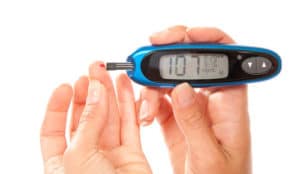Diabetes Mellitus
 Diabetes mellitus (DM), commonly referred to as diabetes, is a group of metabolic disorders in which there are high blood sugar levels over a prolonged period and is characterized as an elevated level of blood sugars.
Diabetes mellitus (DM), commonly referred to as diabetes, is a group of metabolic disorders in which there are high blood sugar levels over a prolonged period and is characterized as an elevated level of blood sugars.
Types:
- Type 1 DM
- Type 2 DM
WATCH WORLD’S BEST VIDEO LECTURE ON THIS TOPIC (SIGNUP REQUIRED)
Type 1 diabetes mellitus:
Type 1 DM is insulin dependent and is characterized by loss of the insulin-producing beta cells of the pancreatic islets, leading to insulin deficiency.
Symptoms:
- Polyuria (frequent urination)
- Polydipsia (increased thirst)
- Polyphagia (increased hunger)
- Weight loss
- Blurry vision
- Feeling tired
- Poor healing
Cause:
The cause of type 1 diabetes is unknown. However, it is believed that it is a genetic disorder.
Risk factors include having a family member with the condition.
Underlying mechanism:
The underlying mechanism involves an autoimmune destruction of the insulin-producing beta cells in the pancreas.
Diagnosis:
Diabetes is diagnosed by testing the level of sugar or A1C in the blood. Type 1 diabetes can be distinguished from type 2 by testing for the presence of autoantibodies.
WATCH WORLD’S BEST VIDEO LECTURE ON THIS TOPIC (SIGNUP REQUIRED)
Treatment:
Insulin Therapy
- With an injection
- Or with an insulin pump
Type 2 diabetes mellitus:
Diabetes mellitus type 2 (also known as type 2 diabetes) is a long-term metabolic disorder that is characterized by high blood sugar, insulin resistance, and relative lack of insulin.
Symptoms:
- Polyuria (frequent urination)
- Polydipsia (increased thirst)
- Polyphagia (increased hunger)
- Unexplained weight loss
Long-term Complications:
- Heart disease
- Strokes
- Diabetic retinopathy
- Blindness
- Kidney failure
- Poor blood flow in the limbs which may lead to amputations
Causes:
- Obesity
- Lack of exercise
Diagnosis:
- Fasting
- Plasma glucose
- Oral glucose tolerance test
- Glycated hemoglobin (A1C)
Treatment:
- Staying a normal weight
- Exercising regularly
- Eating properly
- Dietary changes
WATCH WORLD’S BEST VIDEO LECTURE ON THIS TOPIC (SIGNUP REQUIRED)
The information provided on this website (www.MadeForMedical.com) is only for educational purpose.
While we tried hard to write quality articles but still, the articles and the information within them is not guaranteed to be free of factual errors or typos and hence may not be correct. You are advised to independently verify the claims in the articles and make your own conclusion.
